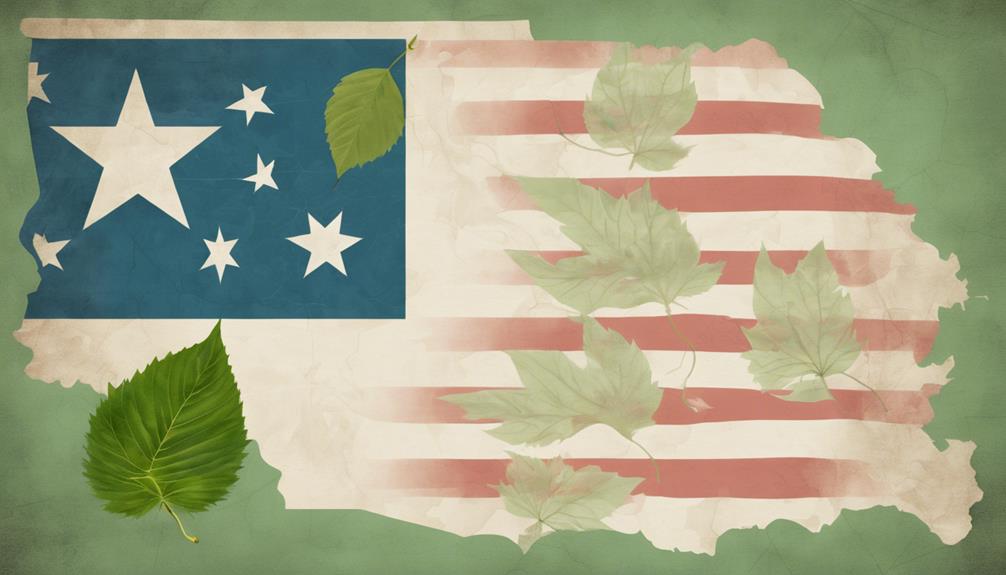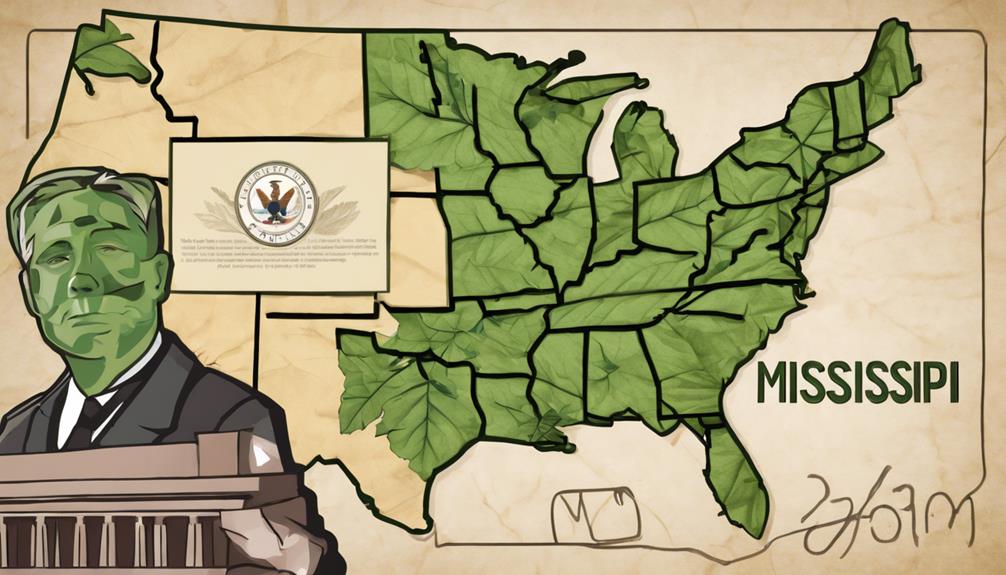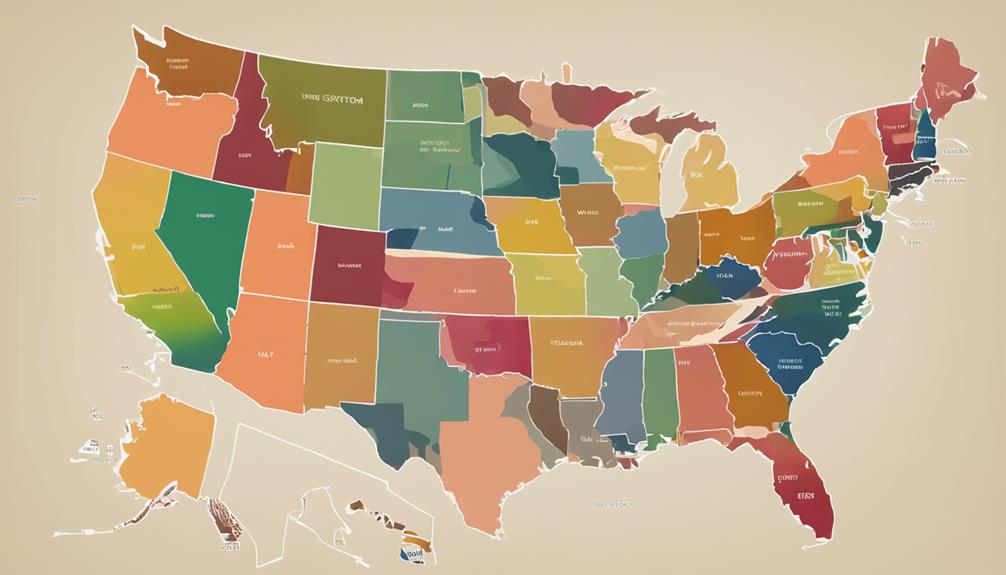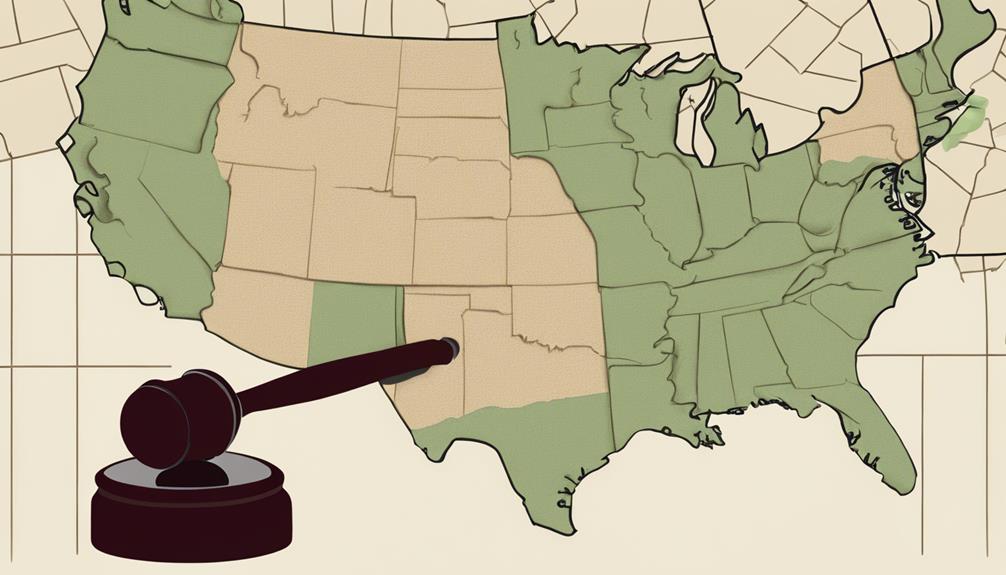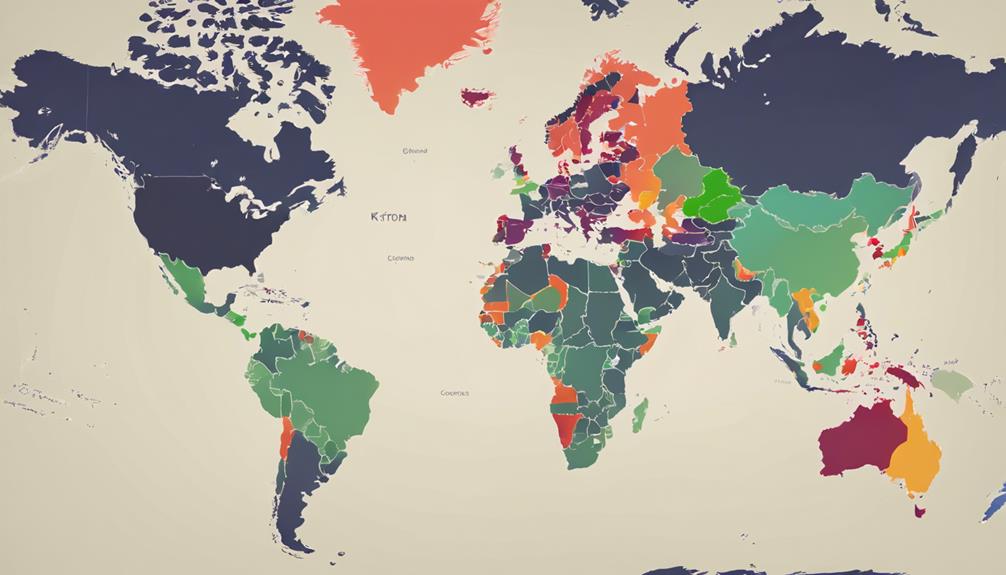You might be surprised to learn that the legal status of kratom in North Carolina has been a topic of ongoing debate and scrutiny. While kratom remains legal for individuals over 18 years old, recent legislative developments have raised questions about its future in the state. Stay tuned to discover the nuances of kratom regulations in North Carolina and the potential shifts that could impact its legality.
Key Takeaways
- Kratom is legal in North Carolina for individuals above 18 years old.
- Advocacy efforts prevented a potential ban on kratom in 2016.
- House Bill 747 established an age restriction of 18 for kratom possession.
- North Carolina advocates actively maintain kratom's legal status.
- Consumers can access and use kratom without facing legal repercussions.
Kratom Legal Status Overview
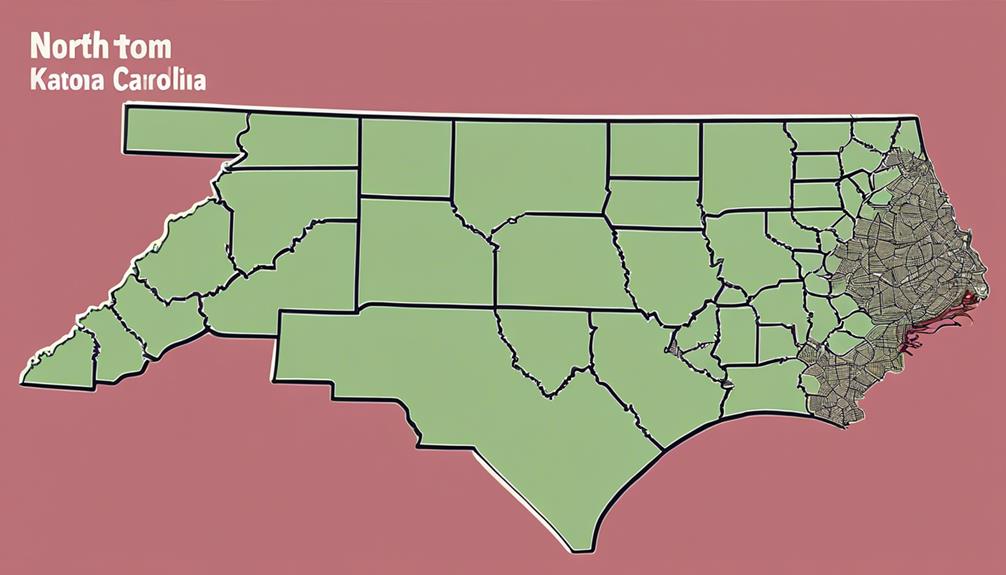
Discussing the legal status of kratom in North Carolina involves understanding the regulations governing its possession, consumption, and distribution within the state for individuals aged 18 and over. Kratom is legal in North Carolina, allowing those above 18 to possess, consume, and distribute it. In 2016, the state faced a potential ban on kratom, but advocacy efforts successfully maintained its legal status, guaranteeing its availability to the public. House Bill 747 implemented an age restriction of 18 for kratom possession, emphasizing responsible usage among individuals. Despite being a Schedule 1 substance in other states, advocates in North Carolina have effectively prevented kratom from facing the same classification, safeguarding its legal status within the state. This legislation guarantees that consumers can access and use kratom for various purposes without fear of legal repercussions, contributing to a thriving marketplace catering to diverse preferences in North Carolina.
Legislative History of Kratom in NC
When examining the legislative history of Kratom in North Carolina, you'll see that in 2016, Senate Bill 830 aimed to classify Kratom as a Schedule 1 substance but was not passed. Subsequently, House Bill 747 implemented an age restriction of 18 for Kratom possession in the state. The ongoing efforts of advocates have so far prevented a ban on Kratom, demonstrating a community-driven approach to maintaining its legal status in North Carolina.
Legal Status Updates
Periodically, updates to the legal status of kratom in North Carolina have been enacted through legislative measures. Kratom is legal in North Carolina, with the introduction of House Bill 747 establishing an age restriction of 18 for its consumption. In 2016, advocacy efforts in the state successfully averted a potential ban on kratom with Senate Bill 830, ensuring it was not listed as a Schedule 1 substance. Advocates in North Carolina have been instrumental in influencing the legislative landscape to maintain kratom's legality, emphasizing responsible use and age regulations. The ongoing legislative history of kratom in North Carolina underscores the delicate balance between regulation and preserving access for individuals over 18, reflecting the collaborative efforts of advocates and policymakers.
Impact on Community
The legislative history of kratom in North Carolina has greatly influenced the community's access and regulations surrounding this herbal supplement. Advocates, including the American Kratom Association (AKA), have played an essential role in shaping kratom legislation in North Carolina. In 2016, Senate Bill 830 posed a threat by seeking to classify kratom as a Schedule 1 substance, but thanks to strong advocacy efforts, the bill was defeated, preserving kratom's legal status. Additionally, House Bill 747 later imposed an age restriction of 18 for kratom possession and use in the state. This legislative history reflects the community's engagement and active participation in defending their access to this herbal supplement, highlighting the importance of community involvement in shaping kratom laws in North Carolina.
Current Regulations on Kratom

Regulations in North Carolina dictate that kratom is legal for individuals over 18, permitting possession, purchase, and consumption statewide. The state enforces the Kratom Consumer Protection Act, which mandates that kratom products must be accurately labeled with ingredients to guarantee transparency and consumer safety. Sales are only allowed to individuals above 18 years, with packaging restrictions in place to prevent the suggestion of non-approved consumption methods. North Carolina has implemented specific regulations to protect consumers and uphold standards for kratom products, aiming to balance access to kratom with safety measures that safeguard public health. These regulations are designed to provide consumers with the necessary information about the products they are purchasing while also maintaining the integrity of the kratom market in the state. By adhering to these regulations, North Carolina seeks to create a safe environment for kratom consumers while ensuring the responsible use of the substance.
Age Restrictions for Kratom Use
In order to uphold compliance with state laws and promote responsible consumption, individuals in North Carolina must be 18 years old or older to legally purchase, possess, and consume kratom products. These age restrictions for kratom use are in place to prevent access by minors and promote public health safety. By setting the minimum age requirement at 18, North Carolina aligns the regulations for kratom with those of other substances, contributing to the protection of consumer safety. Enforcement of these age restrictions is vital to guarantee compliance with state laws and to encourage safe usage practices among individuals. The age limitations for kratom use play a significant role in broader efforts to regulate substances effectively and promote overall consumer safety in the state of North Carolina. Remember, adhering to these age restrictions is essential for the well-being of individuals and the community as a whole.
Enforcement of Kratom Laws
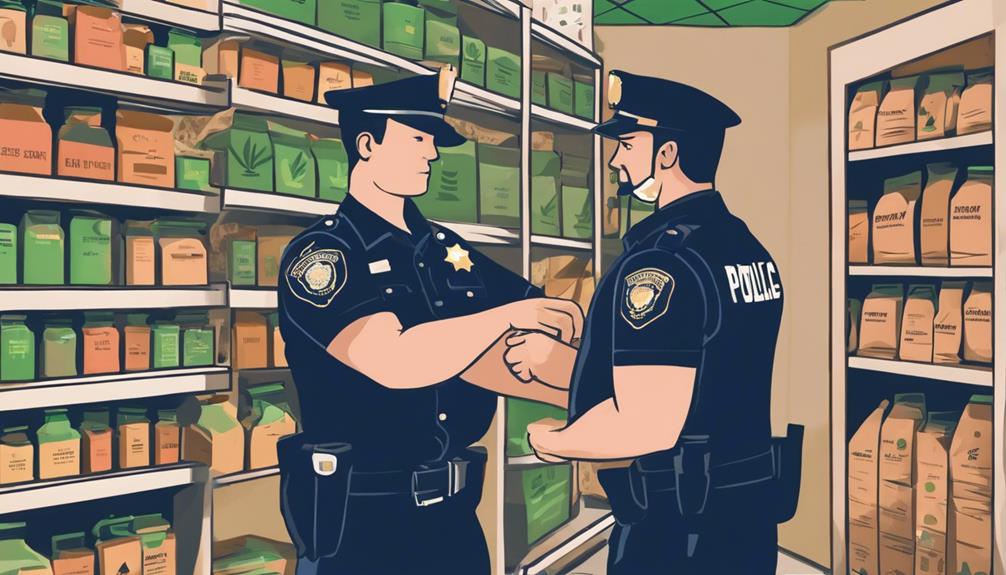
Enforcing kratom laws in North Carolina is an essential responsibility overseen by state authorities to uphold regulatory compliance and ensure public safety. Compliance with regulations, including age restrictions and labeling requirements, is crucial for retailers and vendors selling kratom products in the state. Violations of these laws can result in penalties, fines, or legal consequences for individuals or businesses involved in the distribution and sale of kratom. Law enforcement agencies play a crucial role in monitoring the kratom market to prevent illegal activities or misuse, ensuring that the products are consumed safely and legally. By adhering to the kratom laws in North Carolina, both sellers and consumers contribute to maintaining the legality and responsible usage of kratom products within the state.
Is Kratom Legal in North Carolina Similar to New Jersey?
Kratom legality in New Jersey is different from that in North Carolina. In New Jersey, kratom is legal for residents to purchase and use. However, in North Carolina, kratom is classified as a controlled substance and is illegal to possess. It’s important to research and understand the laws regarding kratom in each state.
Impact of Advocacy on Kratom
Advocacy efforts in North Carolina have been instrumental in safeguarding the legal status of kratom within the state, preventing a ban on its distribution and consumption. The American Kratom Association (AKA) has played a significant role in advocating for quality regulation, research, and the legality of kratom products nationwide. Advocates in North Carolina are pushing for the implementation of the Kratom Consumer Protection Act (KCPA), which aims to establish industry guidelines such as labeling requirements, ingredient standards, and age restrictions to guarantee the availability of safe products to consumers. By 2023, the KCPA had already been enacted in 8 states, with ongoing efforts to promote its adoption across the country. Through advocacy efforts, North Carolina is working towards creating a regulatory framework that safeguards the availability of safe and regulated kratom products for consumers, emphasizing the importance of quality control and consumer protection in the industry.
Future of Kratom Legality in NC

As North Carolina navigates the future of kratom legality, several key points come into play. Legal challenges surrounding kratom use, the level of political support it garners, and the overall public opinion on kratom will shape its fate in the state. Understanding these aspects will be pivotal in determining the trajectory of kratom legality in North Carolina.
Legal Challenges for Kratom
In North Carolina, the future of kratom legality remains uncertain despite past legal challenges.
- Legal battles in 2016 threatened kratom with a Schedule 1 listing.
- House Bill 747 set an age restriction of 18 for kratom use, dodging a ban.
- Advocates successfully averted kratom's scheduling as a controlled substance.
- Future outlook indicates no immediate bans, stressing the need for proper regulations and purity assurance.
Political Support for Kratom
The political landscape in North Carolina shows significant support for kratom, reflecting a positive outlook for its future legality in the state. Advocates successfully prevented a ban on kratom, highlighting the political backing for its continued presence. The passage of Bill HB747, which includes an age restriction of 18, further solidifies the support for kratom within North Carolina's legislative framework. This indicates a clear intention to regulate rather than prohibit kratom, showcasing a progressive stance towards its legal status. Proper regulations are seen as essential to address misinformation and guarantee the quality of kratom products. Advocacy efforts and ongoing support are vital in maintaining the current positive trajectory for kratom's legality in North Carolina.
Public Opinion on Kratom
How does public sentiment in North Carolina influence the future legality of kratom? North Carolinians' public opinion on kratom tends to support its legal status, paving the way for potential benefits and responsible regulation. Advocacy efforts and community engagement initiatives are vital in shaping the narrative around kratom legality. The growing awareness of the potential benefits of kratom within the state has led to a more positive outlook on its usage. Instead of advocating for bans, the general sentiment leans towards promoting responsible regulation to guarantee safe consumption. Through continued advocacy, education, and community involvement, North Carolinians are actively participating in determining the future of kratom legality in their state.
